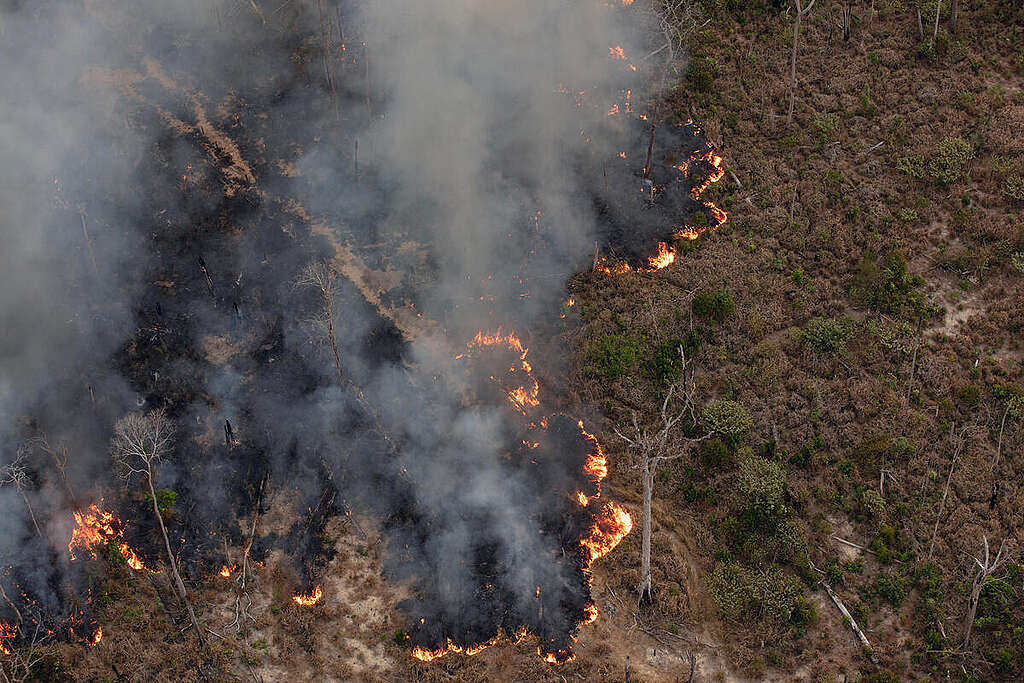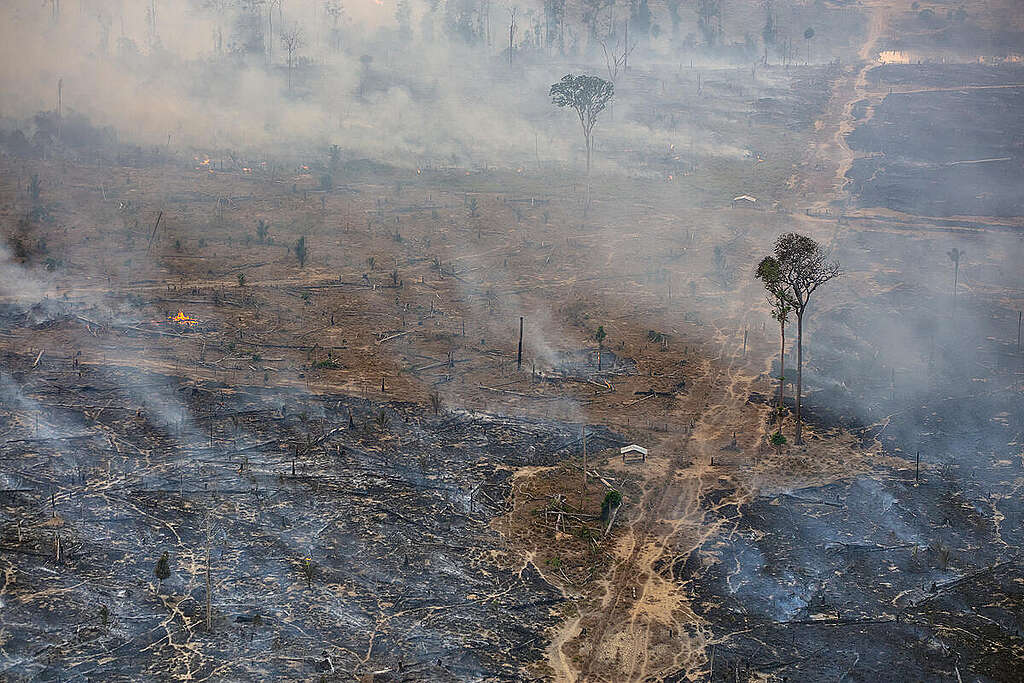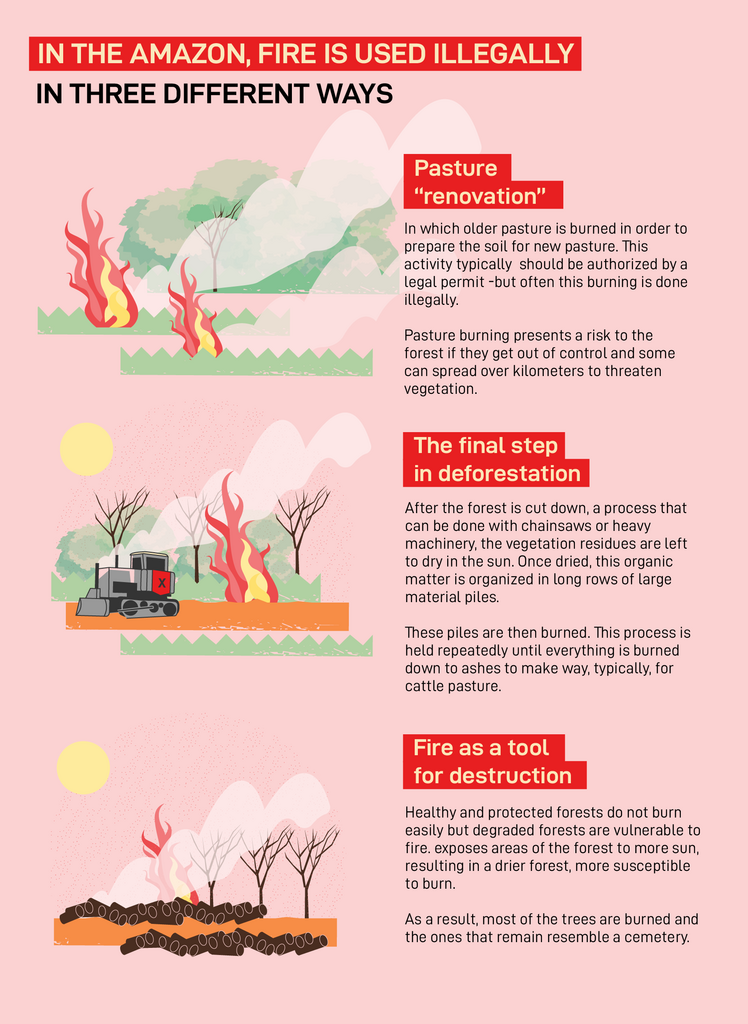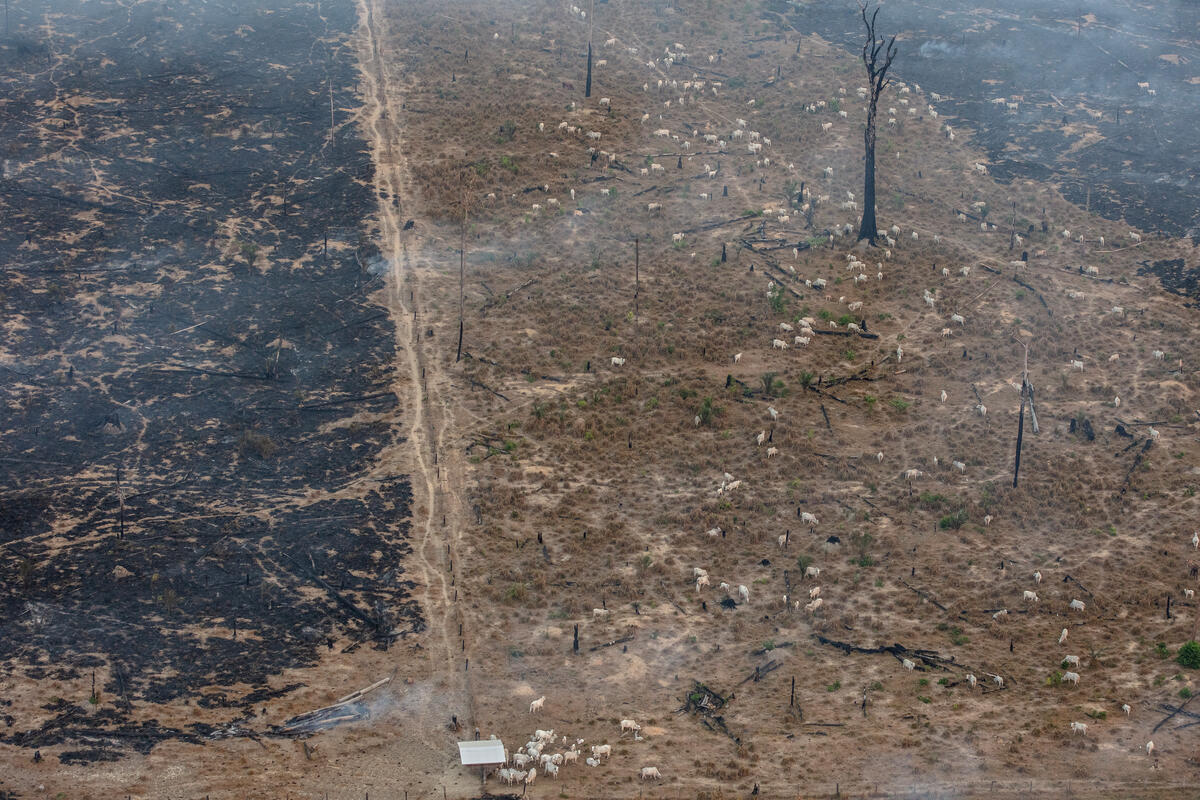Due to a dangerous combination caused by human activity, Brazil is witnessing a sharp increase in the number of fire outbreaks across most of its territory.
Year after year, illegal fires consume thousands of hectares of Brazilian biomes, threatening biodiversity and all life on the planet. Data from the end of August shows a dramatic and alarming increase in fire outbreaks compared to the same period in 2023 in the Amazon, Cerrado, and Pantanal. In this distressing scenario, impunity acts as fuel for this destruction, and the Brazilian authorities must respond quickly: investigate and hold those responsible for illegal fires accountable, while also strengthening prevention measures and adopting strategies to deal with the reality of extreme events.
 Greenpeace Brazil conducted an aerial survey in southern Amazonas and northern Rondônia to monitor deforestation and fires in July 2024. © Marizilda Cruppe / Greenpeace
Greenpeace Brazil conducted an aerial survey in southern Amazonas and northern Rondônia to monitor deforestation and fires in July 2024. © Marizilda Cruppe / GreenpeaceAccording to the Fire Monitoring Program of Brazilʻs National Institute for Space Research (Inpe), in August, the total number of fire outbreaks in the Amazon reached 38,266, representing a 120% increase compared to the same period in 2023. The Pantanal saw a staggering 3,910% increase in fires compared to August last year, although it has not yet surpassed the 2020 figures, when fire outbreaks reached 5,935, compared to 4,411 recorded this year. Meanwhile, the Cerrado registered a 171% increase in fire outbreaks this month from the same month last year.
 Wildfire and Burns in Areas Financed with Rural Credit in the Amazon. © Marizilda Cruppe / Greenpeace
Wildfire and Burns in Areas Financed with Rural Credit in the Amazon. © Marizilda Cruppe / GreenpeaceComparing the period from January to August, 2024 had the highest number of fire outbreaks in the Amazon since 2005, totaling 63,189.
The consequences of fires know no borders. In addition to causing harm to people living nearby, the smoke from fires in the Amazon and Pantanal traveled to distant regions. The state of São Paulo experienced its worst August since Inpe’s measurements began in 1998, with 3,612 heat spots recorded — something never seen before. The reasons are still being investigated, as on a single day (August 23), the number of fire outbreaks in the state surpassed those recorded across the entire Amazon biome, where illegal fires are common at this time of year.

“The fires we see consuming the country and affecting our health are started by human activity, and in the context of extreme weather events, it seems to be becoming a cheap strategy for destroying nature that still goes unpunished. Those responsible must be identified and properly punished, and the prohibition to access financing in such situations is a measure that should be enforced by banks and regulators,” said Thaís Bannwart, spokesperson for Greenpeace Brazil.
There are two studies that Greenpeace Brazil released on the 5th anniversary of the Day of Fire, along with another analysis on embargoed areas that received rural credit, highlights the need to end impunity and restrict financing for those who engage in destructive production practices.
 Monitoring of Deforestation, Forest Fires, and Wildfires in the Amazon. © Marizilda Cruppe / Greenpeace
Monitoring of Deforestation, Forest Fires, and Wildfires in the Amazon. © Marizilda Cruppe / GreenpeaceHere are some actions that Greenpeace Brazil advocates to face this challenge regarding illegal fires issue:
- Brazilian governments need to enforce penalties for those responsible for illegal fires – Beyond issuing fines and embargoes on those who set biomes on fire – police investigations must lead to penalties and technology must be incorporated to improve investigations. They must also enhance operational capacity for fire prevention and control – It’s not enough to have fire brigades only part of the year. In the context of extreme weather events, Brazilian governments need to develop short, medium, and long-term action plans to adapt to climate change and they must continue fighting deforestation and work to achieve Zero Deforestation even before 2030, which is the greatest contribution Brazil can make to help mitigate the effects of the climate crisis we face.
- Banks MUST ACT NOW! In April, Greenpeace Brazil released the report Bankrolling Extinction (in Portuguese) which reveals how the lack of proper oversight by financial institutions when granting rural credit benefits landowners involved in deforestation, fires, land grabbing, and other environmental and social violations. The report calls for the financial system to implement continuous monitoring of financed areas and to deny access to credit for those who have illegally used fire, among other improvements.
Those who finance environmental offenders are also part of the problem and must take action.

 2 months ago
43
2 months ago
43


